I'm not claiming any great insights here, but I spent some time with Raking Light by Eric Langley and google which helped me understand the poems better and I thought I might share what I've found.
Don't wanna be here? Send us removal request.
Text
Goodbye Tumblr
I’m getting annoyed with Tumblr so I’ve relocated to wordpress. My latest and hopefully future posts (along with the ones I’ve already done) can be found at : https://rakinglight.wordpress.com
0 notes
Text
Raking Light
As Eric’s excellent epigraph explains, this is the light that is shone over a painting to reveal earlier attempts. So the poem makes this into a metaphor for hidden secrets and memories resurfacing.

Pentimental - pentimento is the visible trace of an earlier painting beneath the paint on a canvas. It originates from the same root as repentance - e.g. it’s something the artist did and then regretted so changed or covered over. Apparently the most famous example is from a Da Vinci painting of Christ where he changed his mind about which way Jesus’ finger shoudl
Surge-lines - paintbrush dragged over the surface.
Underdrawn in emergency - playing on the root of the word to suggest emerge, something that is submerged appearing. Etymology is important in this poem because it reveals earlier, now hidden, meanings of words a bit like the light reveals earlier hidden meanings of paintings.
Yoked - bound up, but perhaps playing on the homonym “yolk” which is used in paint.
Slaked lime - when mixed with chalk this becomes whitewash - itself a metaphor for things being covered up.
me pinxit - latin for: he painted me. This is how artists sometimes put their signature on things. e.g. me pinxit Eric. (Eric painted me).
Body-colour - opaque pigment used in painting.
Rippling up from the patio - Eric shifts from alluding to renaissance painting to alluding to Brookside. The dead body is under the patio!
Tenting - pierce through / bulge. Eric looked shocked when I suggested this was also a word for how an erect penis shows through trousers. But he can’t hide it. It is.
Facture - mix of paint.
Verdaccio - mix of black, white, yellow to make green for a fresco.
Ocra rossa - red pigment.
Prime - underpaint.
Sinopia - dark red colour.
Gravid - pregnant
Unrepentant - as in no longer a pentimento!
all clocks stop - Auden reference?
Lithopone - surface gloss
Whorl - a fingerprint - another metaphor for guilt.
Fat-and-lean - a principle in oil painting is that you paint the fat over the lean.
Ultraviolence - from Clockwork Orange. (Which itself has stuff about how you can’t shut your eyes to things - literally in Alex’s case - and is about how much you can suppress.)
Neon Josephine - Napoleon can’t ignore this request for sex because she is shining out.
Mice in the columbines - Eric says this is a reference to something in his dad’s poetry about how the etymology of columbine isn’t about doves, it’s from mice. I can’t find anything like this anywhere.
Section 7 moves to elusive memories resounding, so the lines break up a bit.
Tithonic - relating to rays of light that produce a chemical effect. Also, Tithonus is the lover of Aurora, who in Greek mythology is granted immortality but not youth. A nice reference for things never disappearing/dying.
Gilt - covered in gold, but also sounds like guilty. Lady Macbeth makes this pun when she’s off to cover the grooms with Duncan’s blood.
0 notes
Text
Eurydice in Euston Square
Eric says that this is the poem that people have told him is their favourite. You know why I think this is? It’s because it’s the poem that you have to look up the least stuff and you can get a pretty good idea of what it’s on about without knowing a load of extraneous information. I’m starting to get a sense that Eric starts off his book of poems with his most obscure ones. If I was hoping to increase his book sales, I’d be advising him to put those ones somewhere near the back and start with this one. So I will type up a few things but you probably don’t need them. Also, if you’re wondering which poem to read first, read this one.

So it’s just patronising of me to tell you that Eurydice was Orpheus’ beloved who died and Orpheus with his beautiful music went down to the Underworld and was allowed to take her back with him so long as he didn’t look round before they got out, but he did look round so she went back to the underworld.

Euston Square is an underground station. You knew that.
“Perhaps you heard of how we left them” Orpheus leaves his fans and heads to the underworld. Notice the pronouns - who is the we?
“they cede a reweave” - Eric’s interested in the link with these words so weave and textile and text. Weaving might also bring up other Greek myths: the Fates who Orpheus is trying to overcome; Arachne who stood up to the Gods like Orpheus; Penelope caught out trying to stay faithful to her husband by reweaving her shroud.
Proserpina - Latin for Persephone - queen of the underworld, also allowed to leave the underworld annually for spring (when the wheat is “gold”)
“Requickning” - quick also means alive.
“Faintly you complain, that you were loved”. Twelfth night reference - Aguecheek reminisces that he was “adored once too”.
“string.. spandrel… riser… trim… tack” bits of stairs.
“Paternoster” - an old fashioned lift (also “our father” e.g. say your prayers!)
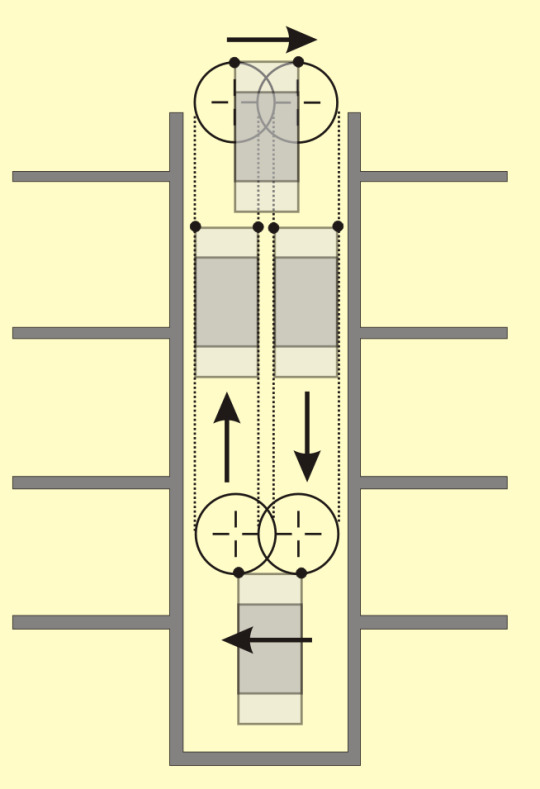
“spindrift” - spray blown from crests of waves by the wind.
“600 surgence” - this bit gets into some erotic memories - the electric charge of the underground.
“in the residue” - Eric looked disgusted when I suggested it was semen. Given he’s just told us about his “tough touch and urgent”, I’m sticking to my sticky reading.
“alphabet spent on your inner thing” - oh, it’s disgusting when I suggest that residue means semen but…
“static” - meaning standing still, stuck. The opposite of “ecstatic” which we get later. Also white noise from a radio. We get stuff about electronic communications. Alexander Graham Bell thought that his telephone might be used to communicate with the dead. I also think of Godard’s Orpheé where the radio communicates mysterious messages to Orpheus.

“whistling Dixie” - a song about wishing you were somewhere else and back in the past.
“clinker stair” type of stair.
“mine eyes’ dazzle” What Ferdinand says after looking at the dead body of his sister in the Duchess of Malfi.
“preposterous” - etymologically means the before coming after.
“portland stair” Eric says that Euston Square station was the first underground station to use this type of stone for its stairs.
0 notes
Text
Divided-Back
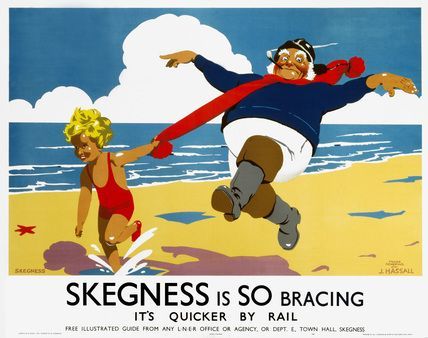
It is a common cry among my GCSE students that they wish they could just ask the poet what the hell they meant. I always roll my eyes at this and tell them that it doesn’t matter, that it wouldn’t help, that their own interpretation is the most important thing. Well obviously that’s a load of nonsense. And so I come to this entry fully armed from a night in the pub with Langley himself. The author is dead? Long live the author!
There are two main keys to this poem. One is the Edgar Allen Poe short story the Purloined Letter. In that story a detective, Dupin, finds a stolen letter (containing compromising information about a lady). The police search everywhere including sticking needles into the cushions of the man’s house. Dupin finds it “hidden in plain sight” on a card rack in the room. Dupin went in covering his eyes in green spectacles pretending he had weak eyes. He then comes back the next day to retrieve a snuff box he had purposefully left behind. He arranges for someone to fire a gun on the street outside. The robber is distracted and Dupin retrieves the letter.
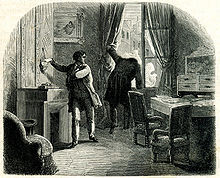
There’s an interesting extra detail which is that Dupin swaps the letter for a duplicate he has written. This ties up nicely with the set of poems “Of those from the ships”.
The second key to the poem is that Divided-Back is a term for a postcard and this poem is, and I know you’ll all be very excited to hear this, Eric’s most Derrida-influenced poem. Having no intention of ever reading a word Derrida has written, I’m just going to make some stuff up about what I think Derrida might have said. And my understanding is that this is very much in keeping with Derrida’s ideas. (Ha ha, just a little post-structuralist joke). Derrida writes a book called “La carte-postale: De Socrate à Freud et au-delà”. You can never have a private language because language itself implies a third party. Words get their meaning from how others use them. The postcard is symbol for the lack of privacy. There’s also some stuff about how it’s really the reader who writes the postcard. In this book, he writes an analysis of the Poe short story (The Purloined Letter) critiquing Lacan’s reading of the story. Last night in the pub I wrote down: “Lacan you never arrive at the other. Derrida: the letter has always already arrived.” So that clears that up!
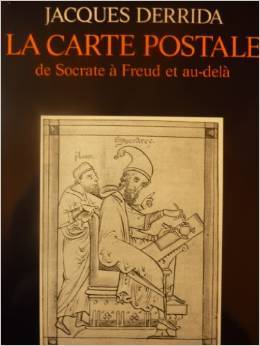
Eric was saying that the first three poems are about the couple. In the next three, there’s a third party involved.
Here’s a very simplified summary of the four sections: 1, Eric writes a postcard where he tries to genuinely say a loving message. 2, things and people get in the way of us understanding the meaning. 3, the loved one sees through all this and “gets” the postcard. 4, unbothered by intermediaries, Eric declares his love.
Ok. Into the poem:
You’ll notice the layout of the poem apes the way the back of a postcard is divided into two. We might perhaps also think of the separation of the couple that the postcard is hoping to bridge.
“I shall be under the clock”. The titles of the sections comes from a Victorian manual on how to write postcards.
“We meet in white frame”. In a postcard you’re constrained, restrained, can’t think (write) outside the box.
“Block out” - either layout print in blocks or cover up / censor.
“Victorian lilac or green issue” types of early postcard printing.
“two pints of stout… donkey ride” - classic seaside postcard image.
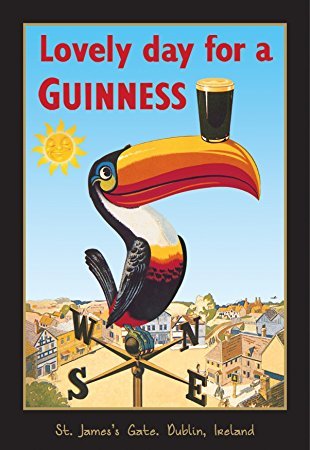
“I do wish you were here” - the writer struggles for authenticity, stuck using clichés and other people’s words (Derrida), but that doesn’t mean he doesn’t “mean” it. Sometimes the truth is staring you in the face (Poe).
“held up to her light” - as if looking for invisible ink.
“no secrets” - a postman can read it.
“empty places” - description of a postcard or many other things.
“write-aways” - original name for postcard
“post-haste” - the origin of this phrase is that it “haste, post, haste” was an instruction that used to be written on letters.
“double-impress” - the letter writer who makes a carbon copy before sending it (eg Kafka). When thinking about the third person added to this couple, we might think about us, the readers. These “secret” poems or letters or cards are being written with an eye to a broader readership. Like a Shakespeare sonnet, or any published love poem, they’re not really being written to be read by a single private loved one, are they? And in that way they’re like postcards.
“drop-sink… fugitive ink” - technical printing terms.
“Impossible synchronicities” - you don’t write a postcard and have someone read it at the same time.
“in plain view… sticks the wall” - Now we’re into the Poe allusions.
“passes show… overseer… orisons” - we also get some Hamlet allusions. Although Hamlet is, according to Ophelia, “the observed of all observers”, he still says he has stuff that isn’t in plain sight (“passes show”). It is Polonius who reads through Hamlet’s love letters to Ophelia. He is the third observing party. But does the “overseer” have a good look or overlook the crucial detail?
“dead letter” - unclaimed or undelivered piece of mail.
“ghosts that spook the posts” - Ghosts makes us think of Hamlet. His father’s ghost is a message for him to read. But also Kafka described his love letters as ghosts.
“tea leaves… apple peel” - this is the idea again that unlike the straightforward message of “wish you were here” which means what it says, these are messages that people have to interpret in complex mystical ways.
“turn and turn again” this is a Iago reference. Again a messenger that you cannot trust.
“grus aus” - a misrendering of “greetings from” in German. A “gruss aus postcard” is a type of old postcard.
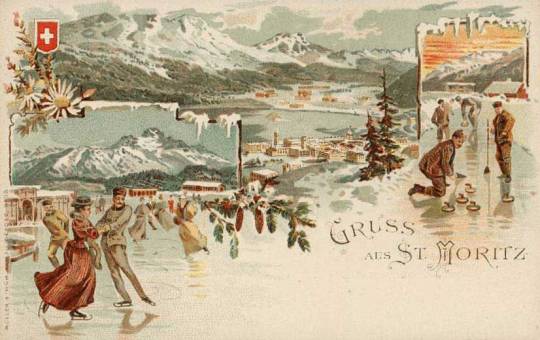
“foxed” - as well as meaning tricked, this describes a corner of a piece of paper that’s turned up.
“that would scan” - Hamlet says this when considering killing Claudius while he’s praying. It sounds OK but it isn’t enough.
“each cushion is needled” - now we’re back with Poe.
“you sit behind green glasses” - after the incompetent police officers, the third party, the loved one comes in who sees what is in plain sight.
“gently take what they mistake” - Theseus says this about Bottom in Midsummer Night’s Dream. So although Eric’s writing is all bumbling and full of mistakes, a wise and noble reader is able to see what he means. (Wordsworth speaks of “gentle reader”).
“I didn’t hide it, so you couldn’t find it” - the Poe character escapes detection at first precisely because he didn’t hide the letter.
“I didn’t hide it so you couldn’t find it” - I hid it so you could find it!
“Come round for your snuffbox” etc - this is what Dupin does in the Poe story.
“Poins… Turpin”. Poins is a character in Henry IV Parts 1 and 2 who gives misleading messages. Turpin is of course the highwayman who got in the way of the post.
“I love you” x3 - hoping for authenticity from the ultimate cliché?
“If looking liking moves” this is what Juliet says when her mum tells her that she should like Paris at the party. There’s a suggestion that the reader has to want to like what they read. Eric has written his declaration of love, the loved one has to want to read it. Or it could just mean, sometimes what you see is what you get / love. This scene is concerned with surface reading - Lady Capulet tells Juliet to “read the volume of young Paris’ face”. Of course Juliet doesn’t fall in love with Paris, but she does fall in love at first sight at the party. So looking does liking move. It’s interesting that the poem ends on a conditional clause. I guess maybe it’s open to the reader’s interpretation and my Year 10 students were wrong after all.
0 notes
Text
Du He Tao
Du He Tao
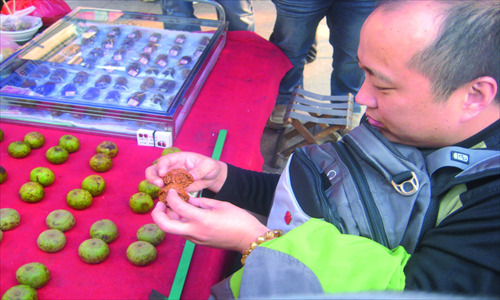
Those of us who went to Eric’s book launch have a head start on this one. Because here he told us that this was written for his girlfriend and the title refers to walnut gambling in China. Identical walnuts (or as similar as possible) are very valuable. They are used, I think, for playing with in your hand to relax you like those balls. I just typed in “relaxing hand balls” into google and apparently those metal ones are Chinese and they’re actually called “baotang balls”. So the more similar the two walnuts are, the more valuable. There is a practice of paying a set price before the walnuts’ green coverings are removed as a kind of gambling on whether you’ll get a matching pair which would be worth more than you’ve paid. We can see that there’s a nice metaphor for dating or starting to go out with someone and taking a chance on whether you’ll fit together. It’s interesting that it comes straight after “Tact” which is kind of about how you shouldn’t be too similar.

Eric runs through an amazing array of metaphors linked to this. So we have sciencey/atomic, DIY, bomb-disposal, safe-cracking, bird-pecking, gambling, computer-language, biological/medical sort of, but not strictly, section by section.
“When I’m all hulled up” - Eric draws out a nice metaphor for the single man being confined in his walnut or way of life or bachelor pad and love makes its way in.
“Husky” - having an outer shell, or having a sexy voice. I hope Anne-Laure doesn’t mind it if I suggest that this may refer to her sexy French voice.
“the heartnut aches” - heart nut is the seed of a Japanese walnut. Also an allusion to the opening of Keats’ Ode to a Nightingale “My heart aches��.
“You ground around it lick” - In China, apparently, experts have a better chance of spotting identical pairs. However, I saw nothing about them licking them. I’ve been quite taken aback by how surprised everyone seems to be about my sexual readings of the first two poems. So I’m just going to leave you with the image of the buyer putting their lips around the two walnuts. And say nothing more.
“Give lip… flushed over… quite tight”. Nothing more to say. Nothing at all.
“Fetch Felix… Radical Squad, Trojans.. long walk” - This is about bomb disposal. The first bomb squad (in New York in the earlier 20th Century dealing with mafia since you ask) were called the Radical Squad. Felix means lucky in Latin and is the name of the unofficial mascot of bomb disposal. Trojan is a mine-clearing vehicle. And the long walk is a phrase used about bomb disposal. And we see this metaphor in the verse with “hair-triggers… trip-wire”.
“With ink from crushed walnuts” this is what Da Vinci used in his notebooks.
“a foetus in utero” - Da Vinci did draw one of these. But also in keeping with the walnut image.
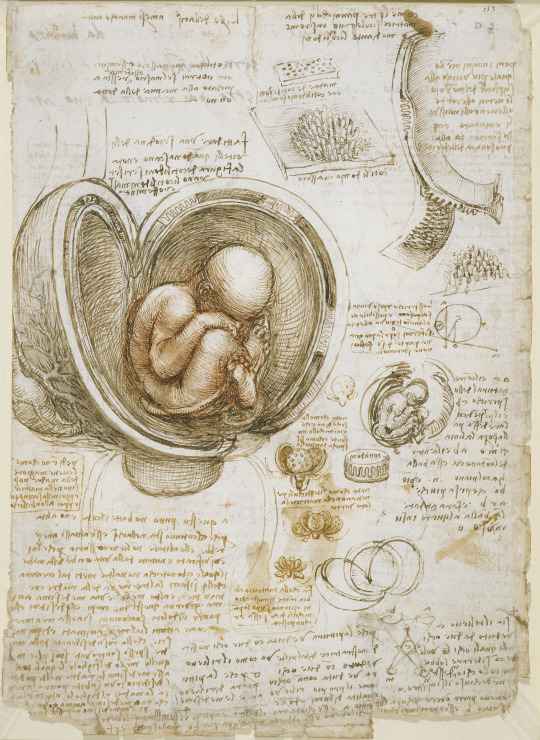
“If there is no love, what then?” a quote from Da Vinci in prison (enclosed) for sodomy.
“Ectoderm” - outer skin.
“brain-pan” - skull.
“Passerine” an order of birds. Passer is the latin for sparrow. This section moves more to the image of a bird pecking at a nut.
“A man’s house is his castle and each man’s home, his safest refuge”. This is a quote from Edward Coke, an Elizabethan Lawyer, so right up Eric’s street. I was wondering where the second bit came from, but that’s the whole quote. I think now we move into the idea of your girlfriend moving in with you. If you let someone into your house, they’re going to change things.
T5 to T8 - I’m not sure this can be right, but this seems to refer to a type of lighting strength. Certainly I still have energy efficient lightbulbs in my flat that date back to when I had a more-ecologically minded boyfriend move in with me. So, you know, this bit really spoke to me.
“Pericardium” membrane enclosing the heart.
“Epicardium” - membrane which forms the innermost layer of the pericardium.
“Myocardium” - muscular tissue of heart.
“Endocardium” membrane which lines the chambers of the heart.
“Ventricle” - cavity of the heart. (I think we get what kind of stuff is going on in this section).
“seventy-two times per minute” - heart beat? But why 21,000? STOP PRESS. I cheated and asked Eric. It's the number of nerve receptors in the human epiderm (he thinks)?
Vena Cava - the name of the vein that runs from the heart.
Chordae - tendons in your heart, known as the “Heartstrings”. I’d never really thought that would be an actual thing that was your heartstring. Huh.
“O, O, O” - what is this? I can only think of the Wasteland (O O O O that Shakespeherian rag).
“Peterman” - slang for safe cracker. We get a heist theme in this section like Eric’s walnut is a safe waiting to be cracked.
“Bertha’s Gift and Home Furnishings”. The Hole in the Wall gang were caught breaking into here, it’s a store in Las Vegas, in 1981. They were called the Hole in the Wall gang because… yup.
“Tete de Femme” - Picasso painting stolen from San Francisco Art Gallery in 1965.
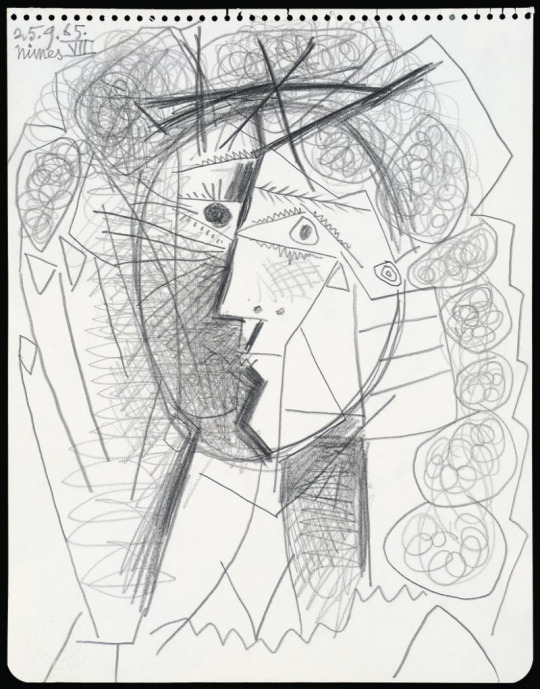
“Bourne-shell” - this bit is all about computing. These are different “shells” which are how you access your operating system on your computer. “Korn-shell” is a development of the “Bourne-shell”. And C-shell and Bash are the same kind of thing.
“-sh” is the name of an executable file for Bourne shell (or something like that).
| - this punctuation (?) is used in computing language.
“Heartstone” - is this something to do with Dungeons and Dragons and the kind of person who’s into computers?
“shortcut” - computing.
“Platforms” - more internet speak.
“relational” - a relational operator is a programming language.
“Give me that man and I will wear him at heart’s core in my heart of heart”. - Hamlet says this. It misses out the phrase “that’s not passion’s slave” - so Eric shifts the meaning to make it romantic.
“hus” - this is icelandic for house. (It’s also hungarian for meat!)
“the hot crowd of thermal swarmed electron of eased atomic orbital in gradient still and radiating” - I asked a wise and lovely Science teacher at my school about this and he replied: “It doesn’t seem to mean a specific thing. If it’s meant to be metaphorical” LOL, let’s hope so, “electrons move quicker when heated and can jump up an orbital (they orbit atoms like planets). When they cool, they slide back down (an energy gradient), radiating light energy. Each atom releases a specific colour of light, like an optical fingerprint. Not sure if that metaphor works with my explanation, but that’s the closest thing it could be. Or he’s just bunged some atom based words together.” <crying with laughter emoji>
“Au coeur du corps” - to the heart of the body. Did I mention that Eric’s girlfriend is French?
“red electric” - we’ve done some DIY and got down to the live wire.
“Lin Changzhu” is a walnut farmer with whom there is an interview in some online paper about the exact thing of walnut betting. He makes 2 million yuan a year from his walnuts.
“betting on skin” this is how the thing where buyers pay a fixed price before the green outer covering is removed. It feels to me like there’s a tension here between the fact that the buyers aren’t interested in the actual kernel of the walnut but the shell despite the fact that a lot of this poem is about drilling into the inner part.
“Cupule” - cup shaped.
“English walnut or nux Gallica” - Eric mentioned this at the launch. He’s English, his girlfriend is French. English walnut is a type of walnut. Nux Gallica is Latin for walnut. Gallica means from Gaul (France).
“Mopan-mopan” I wish I could nail this exactly. mopan walnut is I think a type of walnut you use for massage; mopan is the chinese for disc; mopan-mopang are grinding stones found in prehistoric China used for grinding nuts.
“dog-throw” - there are a number of references to the Ancient Roman knucklebone betting game. The dog was the lowest number on the knucklebone. “Vulture” was the lowest roll of all the bones, and the “Venus throw” (appropriately for the Goddess of Love in a love poem) was the highest roll.
“ratscrew” - Egyptian ratscrew is the name of card game like snap.
“slapjack” - I can’t remember what we used call this, but I played it loads, it’s like snap but there’s that thing where you race to slap the pile. Anyway, once again trying to get by luck a match. (Although incidentally if you wanted to score high in knucklebones, apparently, you wanted the bones to all be different, not matching. I’m not sure if we’re meant to worry about that).
“government official’s hat, a chicken’s heart, a lantern” - these are, delightfully, names the Chinese give to different shapes of walnuts.
“front-run vigorish” I almost didn’t bother looking these up, which is kudos to Eric, because it just sounds like in a rush and kind of vigorous. But I did. And so I discovered that “front-running” is when you buy stock because you have some secret knowledge that it’s going to go up and “vigorish” is the percentage deducted from a gambler’s winnings.
“nutshell” - Has it really taken this long for our Hamlet-loving poet to use this word in a poem about nuts? And is this all he’s going to give us? Is it too obvious? Do you think Ian McEwan has ruined it for him?
“acupoint” - acupuncture point - obviously Chinese link.
“kerf” - slit made by cutting with a saw.
“swarf” - filings produced by machining.
“surfy cream curls and open out” - when Eric read this poem aloud, it sounded like it was totally filthy. And I swear I wasn’t the only one to say that. You’ll notice how restrained I’ve been typing here. But aside from the testicles, the whole thing really is about getting into someone’s vagina, right? I guess those of us who know Eric and Anne-Laure can be pleased that it seems to be a poem about Anne-Laure getting into Eric’s vagina.
“sat with a crimped copy of Homer and a lucky cricket”. This is lovely, isn’t it? Little Eric squashed in his nutshell. It feels like this is an actual allusion to something. For example, why Homer? Maybe it’s a personal allusion between him and Anne-Laure. If not, the best I can do is it made me think a bit of Keats’ “On First Looking into Chapman’s Homer” with that sense of sudden new discovery etc.
“rolled round, palmed around” - now that someone’s got into Eric’s vagina, they seem to be giving him a good “palming around”. This goes back to the purpose of these walnuts which is to rotate them in your hand and it’s meant to be good for the “circulation”.
“I type up slow happenstance on keywater brightboarding” - This give me an image of the two of them in bed, Eric typing up his poem, but quietly and slowly so as not to wake her, and the glow of the keys being the “brightboarding” as well as a little sense of sailing away, stretching out, freed from the shell.
1 note
·
View note
Text
Tact
After the first two, this seems much much more straightforward. Tact means skill or sensitivity but from its Latin origin means touched or sense of touch.
The epigraph is from Stephen Gosson “The School of Abuse” written in 1579. He is an anti-theatre pro-clergy guy and he’s complaining about the bodily vulnerability that comes from going to the theatre, hearing their words and it seems to work as a kind of: don’t let other people in. The subtitle is “containing a pleasant invective against poets...” This is something Eric is big into when it comes to Shakespeare: fear of infection, vulnerability, linking with others. The image of words seeping into your ear might make us think of Hamlet’s dad being poisoned through his ear or Lady Macbeth wanting to pour her spirits into Macbeth’s ear.
First Repetition. This feels like it’s something specific but I can’t place it. Is there a post-structuralist thing about whether something is repetition or whether it’s difference? Are you trying to be the same as your beloved or be different from them? Repetition might make us think of rehearsal (where you might have a repetiteur) which would link to the theatrical epigraph. The prefix “re” is important in this poem. Without the “re”, petition originally means seeking or aiming for. The speaker repeatedly seeks out the beloved.

Palm to palm. This is alluding to Romeo and Juliet. This is from their first meeting when they speak in a perfect sonnet to each other. Later we’ll get mention of Friar Lawrence and the Nurse. In R&J, intermediaries get in the way or cause problems e.g. the letter to Romeo doesn’t reach him so he thinks Juliet really is dead so he kills himself.
Contracts kiss. In R&J it’s “tender kiss”. Is this a play on “tender” having a contractual meaning e.g. put out to tender? This may seem a stretch (tendentious even?!), but Eric is really into his “ten...” words.
Intergraft: gardening: unite by grating, inserting a graft into another tree.
Haptic: sense of touch.
Unmediated: nothing in the middle. This is really the same word as “immediately” which is repeated and repeated in this verse.
There’s a lot about the same thing “tact to tact... hap to hap”.
“Lap” - groin, overtake, lick. What would Eric do if he could “lap himself”? We can only wonder. You can see how there’s a move from loving another to loving the same as you (yourself?)
“You and I could crush out and”. Taking to the syntactical level the desire to get rid of anything in-between speaker and beloved.
Parcel force: ha ha. Now we’re taking further the desire for nothing to get in the way. “riposte” is a fencing term and means reply. But sounds like it means “post again”.
Seriously, get a load of the linguistic fireworks in the second half of the “third repetition”. Read it as it is. Then read it putting the “re-prefix” in front of every word that isn’t “to” or “it”. I just think this bit is bloody clever. Without the “re”, it’s like he’s not even repeating his lover, he is his lover.
Fourth Repetition: all synonyms for touch. He’s just repeatedly touching.
Fifth repetition. Now we get a load of words that mean the space between.
“Without the gap, perhaps we can’t get intimate”. Intimate sounds like it’s linked to touching and in, but actually derives from intimus which means inmost.
“Stare” I suspect this isn’t intentional but this is the Latin for “to stand”. So etymologically it’s nice that Eric stands back in order to stare.
“Intently” - stretching towards - note the “ten” stem.
“To you as you”. The person he’s addressing gets their identity back.
I think Eric might hate me for saying this, but is this the poetic version of the idea that it’s important that you and your partner have your own separate interests? It seems like a very heterosexual poem in the truest sense of loving difference. Is Eric reacting to Shakespeare’s Sonnets which perhaps are more homosexual (Let not the marriage of true minds / Admit impediments. Love is not love / Which alters when it alteration finds...) Whatever, I really think the removing “re” trick in the Third Repetition is worth the price of admission alone.
0 notes
Text
Albada: Pigeons on pink
Albada: Pigeons on pink
To understand this poem I think you need to know two things.
Firstly Don Jose Ruiz y Blasco was the father of Pablo Picasso. He was himself an artist and taught art. He painted lots of pictures of pigeons. So much that he was known as “El palomero” (the pigeon fancier). Legend has it that he saw young Picasso drawing some pigeons and they were so much better than anything he ever did that he gave Pablo all his painting materials and never painted again.
Eric’s dad, the poet R F Langley, (I was going to say famous, but maybe admired is the better word), wrote a poem called Jack’s Pigeon. In that poem, a coffee bowl breaks and a pigeon “thuds to the gutter in convulsions”. Jack, who is, I’m bit nervous of defining what Jack is, I think he might be a kind of alter ego for R F, and maybe like a Jack the Lad or man of mischief. Jack sees the probably dead pigeon and checks his “scratchcard”. There are lots of Hamlet references in the poem. I’m thinking there’s a link to the line about “there's a special providence in the fall of a sparrow”. Is God keeping an eye on even the smallest things?
Eric must have been pretty pleased with himself when he made this connection. He’s starting out as a poet, under his father’s shadow. His father wrote a poem about a pigeon. Picasso’s father painted pigeons until Picasso made a better version. Will Eric be Pablo to his father’s Don Jose? I think also, Don Jose’s pigeons look rather lovely. Eric seems to have specifically in mind the one that google throws up which is five pigeons on a pink background. You won’t be surprised that in the end, Eric/Pablo sees that his father’s stuff was better than his.
The Hamlet allusions also work brilliantly with this theme because of course Hamlet is all about a son and the ghost of his father.
Albada means a morning love song in Spanish. I didn’t know the word. But I do recognise Aubade, the French version. Eric says he’s riffing on a number of aubades / albadas in this poem but I can’t help you there. The only Aubade I know in any detail is the Philip Larkin poem. I wonder if there may be an allusion in the description of the blurry outlines in section 2, that become sharply defined in the last section, which remind me a bit of Larkin seeing the blurry outlines in his bedroom becoming sharper at the end. If so, there’s a hint about mortality and fears of death which would fit. Wikipedia tells me that Albada Finder is something in optics, which seems a nice link to themes of the collection.
Orpiment, masticot, Oker de Luce, lac of carmine are all painting materials. Don Jose in the morning is planning some painting.
“Rayleigh… Mei” this is something to do with scientific theories of how light scatters. Like me, you’ll presumably be cringing at the obvious error that the scientist Eric meant is Mie.
“Scumbles" - give a soft effect
“Envious” foreshadows how he’s going to feel about his son.
“civil” - this word sticks out to me. Does it mean polite, ordinary, from the city?
“Dimly” - keeping to the light.
“tender… extension” - Eric is obsessed with words with this root. It’s all to do with reaching out, connecting with another, making yourself vulnerable.
I think we can see that the dawn of the new day is mirroring the coming talent of his son.
“Maria” - is the name of Jose’s wife and Picasso’s mum.
“Jill” - this is the first inkling, I think, that the poem is alluding to Jack’s pigeon. Jill is Jack’s lady (of course).
“Croodling” isn’t this a great word! It means cooing.
“El Palomero” - the pigeon fancier. Apparently Spanish doesn’t have a different word for pigeon or dove. But Jose paints pigeons. However, Picasso as well as drawing pigeons has a famous painting much later in life of a dove of peace. And he called his daughter La Paloma which people seem to translate as “The Dove”. You can imagine she might have preferred it that way. I feel like there’s a lot going on with the idea that the workaday pigeon of the father becomes transformed into the symbolic, beautiful dove of the son.
“Spink” - brilliantly this word means “the cry of a finch”. I wonder how many other birds have a word just for their cry. Did Eric have a moment of serendipitous excitement when he found out it rhymed (hell, contained!) pink? Or did he know this all along?
Senna bush - my botany and the internet lets me down on the connotations of a senna bush, but there is one in “Jack’s Pigeon” by Langley senior, so we’re starting to get more references to that.
“Booby” - idiot, breasts, type of bird. (Also, tit!)
“Jug jug” is the noise a nightingale makes. Also, means breasts! Even I recognise this as a line in the Wasteland. But I’m not sure if it helps specifically to think of that poem, or just that both Eric and Eliot are referring to an earlier tradition of writing about nightingales going jug jug. Apparently it was big in the renaissance.
“full-throated.. god! o god!… shoot.. plum” Something something sex. Perhaps also a little Keats nod. In “Ode to a Nightingale” the bird sings with “full-throated ease”.
“Pomegranate tree” - this introduces, I think, a reference to the Song of Solomon. There’s something about Solomon and pomegranates. “My love, my dove, my fair…” is a quote from that.
“Ignition spark… apples’ pips”. Sex… babies.
“Piz piz” Apparently Picasso’s first words - short for “lapiz” - calling for a pencil. I hope you’re ready for some Freudian penis stuff. Father and son are going to be engaging in some willy waving.
“Pipion” - pigeon.
“Master at the Bellas Artes” - Jose’s job teaching art.
“Kids” childish / jokes.
“Plucks his nib” - masturbation / makes art. Who can tell the difference?
“Squab” - a young pigeon. The word is used in “Jack’s Pigeon”.
“real these really real pigeons” - it seems like we’re back to Zeuxis here. Picasso rivals Zeuxis’ achievement.
I’m not sure at what point we shift from Dad to Son. As of Section 5 we get first person not third. But this seems to be from the dad’s point of view. While I think by Section 7 we’re from the son’s. But I could be wrong.
“the shock that shook” - so this is the dad seeing his son is a better artist.
“Mummed me” - acted as me (mummer) / became my mum / shut me up.
“Barbels” - little beard hairs (on fish? - I got a bit confused by wikipedia here, do fish have beards? and I thought we were talking about pigeons). Anyway, appropriate for the developing youth.
“Crappers” - not sure about this. Is this just because pigeons do a lot of pooing?
“Jacobines” - Jacobins of course are the ruthless revolutionaries - is that the role the son takes? I’m not sure if there’s a reason it’s feminine plural. Obviously links us to Jack.
“gall-free” - I wondered if this removal of gall from the pigeons, suggested the transformation of pigeon to dove (symbolising peace)?
“cheaply” - what sound do birds make?
“blackjacked” - knocked out / gambled away / Jack is now Black.
“here come have them then” - this is when the dad gives away all his painting materials to his son.
“throbbing vanes” - “vane” is the flat part of a feather. It’s nice how the paint brush becomes like a wing - so that the young boy can take flight like the pigeons. This feels like an Icarus allusion. I’m not sure if it’s a direct quote from Ovid, but it sounds like the kind of thing you’d get in translations of Ovid. That’s another model for Father / Son relationships we’re presented with. Let’s hope Eric doesn’t get too carried away with his wings of poetry unlike his wise and crafty dad Daedalus. Also, masturbating.
“Big head” - the arrogance of Eric comparing himself to Picasso. And also, penis.
“Rachis” - stem of grass.
“Filoplume” - hair like feathers.
“Barbs” - suggesting insults / stings. Poor old dad.
“Erleben” - experience (German for having lived).
“Avitrol” a bird deterrent.
Section 6 describes favourably the early pigeon sketch by Picasso.
“Gutter” - this word crops up a couple of times. And strikingly near the end of the poem. A candle gutters meaning it goes out or is about to go out. Is Pablo a “gutter” because his dad is now “gutted”? And remember the pigeon in “Jack’s Pigeon” “thuds to the gutter”.
“This one’s for remembrance”. We’re now entering Hamlet rich territory. This line is from Ophelia. I feel like this marks the moment when the son/Eric/Pablo speaks. He’s remembering his dad. Who, like him, knew his Hamlet! (Ophelia’s the name of the pigeon who dies in “Jack’s Pigeon”).
“Old mole” is what Hamlet calls his father’s ghost.
“Sweet Lady” - “Sweet Lady Street” is where the pigeon dies in Jack’s Pigeon.
“Pau Gargallo” - sculpture friend of Picasso, art school in Barcelona.
“Wash Lane” - not sure of the relevance of this - it is a street in Birmingham sort of in the same part of Britain as where Eric grew up. But I’m probably missing something.
“Penfold” - I really really hope this is an allusion to Dangermouse’s helper. A keeper of pens, the tool the poet needs.
“where the two thousand sad souls go” - this is from Hamlet as he sees the army heading off for war - and Jack’s Pigeon has the bowl breaking like “twenty thousand souls”.
“Over-rounds” - this is something to do with gambling - and so I think is linking to Jack going to the betting shop.
“Polish day trip” - Hamlet reference - “Polack”. And in Jack’s Pigeon the coffee bowl called “Part of Poland”.
“eggshells” - Hamlet: “all that fortune, death and danger dare, Even for an eggshell”.
“Rosemary” - Ophelia gives this “for remembrance”.
“pyggion” - If you google this word, you get Eric’s poem and an academic book called “Bare Ruined Choirs” talking about the moat at Crowle. This seems like a cool coincidence. Shakespeare Sonnet talking about growing old. I think there’s something to do with language changing and in the next couplet we get squib instead of squab.
“An old man of Daulis”. Daulis is where Oedipus didn’t go to when he ended up killing Laius. So I think this is a reference to a key father / son rivalry. (Daulis is also where Tereus lived as in the Philomela, cutting out tongue, eating his own child, turning into a bird, Tereus, so maybe there’s a bird link too). But I think Eric is saying: I’m not killing my dad “this time”. It feels like we’ve got a long way into a poem about father/son rivalry without an Oedipus reference.
Pichon - Spanish for little pigeon
Pijon - French for pigeon.
Paloma - spanish dove / pigeon. I think again there’s something here about language changes, transitions between language like the transitions between generations.
“Haunts” - ghosts.
“How pale they glare” - Hamlet says of his dad’s ghost: “How pale he glares”.
“between the lines” - Looking for his father in his writings.
“street lamps, gas lamps” - again thinking of time passing.
“Clayton’s spirits” - I’ve come up a bit of a blank on what this means. Wikipedia has something about Clayton’s being Australian for fake.
Madeleine - think of Proust having his memory brought back.
“Reverbere” - French for streetlight. But also the idea of the memory reverberating.
“How strong is stillness?” - this quotes from RF Langley’s journal entry of April 1977. He talks about going to a church and the children playing, naming Ruth, Eric’s older sister. The line before is “Gestures of children must stay.”
“Conning” deceive or study carefully.
“Hundred good hellos” - this is a phrase from RF Langley’s poem “Il Redentore” which is a church Venice. I got excited by the thought that it sounds like the returner / reviens. But actually it’s Italian for Redeemer. But something about giving back, right? Giving back the paint brushes?
“Frame that”. Guilt. Painting. Setting.
“Attention… tentif” more of the ten…
“Complex feet” - is this a reference to Oedipus whose name means swollen foot? And has his own complex.
Towlines - a nautical rope.
“Pigeon-toed, dove-tailed”. This is clever, isn’t it!
“Da!” - dad, ta da! and maybe also Russian for Yes!
“Fetch” - bring back, grasp, trick, jerk off, resurrect.
“Mirrors… rage” - I can’t help but think of the rage of Caliban seeing himself in the mirror but that doesn’t seem very relevant here. Hamlet holds up a mirror. Eric reflects his dad. As a “compound compliment”.
“Bearded” - old men have beard, but also means “confronted”.
“Bound about” - jumping / tied up.
“Charged” - attacked, energised, accused.
“screwed in your bedclothes” - are we thinking of sex and Gertrude (Hamlet’s mum)?
“swipe” - rushing stroke / steal.
Here is where Eric / Pablo acknowledges the greater ability of his dad. “It’s all still yours, still yours to say”.
“Passing” - going by or pretending.
“Cyclist” - Eric rides a bike / he recycles poetry.
“Pillar” - a symbol of tradition? (Also penis).
“Well outlined” compare the blurred figure of the dad in the early dawn.
“plastic guttering” - see above. Dad becomes different parts of a building: chantlate- piece of wood holding rafters, in other words a protector. But also chant = sing and late = dead. “Flash line” - part of building or a fancy poem. “eavestrough” gutter.
“Bowl” now the broken bowl of Jack’s pigeon seems to be mended.
“Rings” - sounds out and comes round again.
1 note
·
View note
Text
Glanced
Glanced
This poem links together a few conceits. You’ve got Cupid’s arrow firing and causing you to fall in love (at first sight) with a wound. There’s Zeno’s Paradox where he argues that an arrow will never hit its mark because if you froze it at any one moment it would be still and so never moves. This is like his more famous paradox that Achilles will never catch the tortoise in a race because he goes half way to the tortoise, then he goes to the half way again (he’s now a quarter of the original distance away from the tortoise) and then half and half and so on infinitely and never actually gets there. There’s the story of the classical painter Zeuxis who had a competition to be the best painter and he painted some grapes that were so life-like that birds flew to eat them. Aristotle’s theory of sight which is that our eyes shoot out eye beams (rather than light from things hitting our eyes). This appears quite a lot in renaissance poetry - there’s a famous one in John Donne when his eye beam gets twisted up with his lover’s eye beam (sexy!)
Glanced - the title nicely combines a “brief look” with being “struck on the side” e.g. wounded by love at first sight. Eric’s really into Lucretius’ swerve so he probably enjoyed the suggestion that it’s not a head-on collision. In Lucretius an unpredictable swerve of atoms led to the start of the word (rather than all the atoms dropping in straight lines). So in this poem, an unpredictable swerve brings on romance.
In the first verse, at the sight of the lovely lady, eye beams / Cupid’s arrow shoot out but like Achilles or the birds, they can’t actually hit or reach their target.
“lovely looker on” - she looks lovely. and her look is lovely. This first line also reminds me of the quote that “and” is the most optimistic word in English.
“one-eyed Cupid” - I guess closing one eye would help Cupid aim. But it also makes me think of a penis. Students of my English lessons will attest that rather a lot of things make me think of a penis. And that may become clear to you as we go on.
“cocks and shot” - once you see penises, you can’t stop. Also, “shaft straight”.
“wondering way” - I like the way you think this word is “wandering” but the arrow knows right where it’s going. Or at least has a consciousness and is wondering maybe in the sense of being wonderful.
“twisted thread” - this is the Donne reference.
“tumblers beakers break” - acrobats or glass, glass or bird with beak.
“deflected… reflected” - there’s something going on with the etymology of arrows (fleche) here.
“mote on float” - judge not the mote in your brother’s eye (St. Matthew). More eye stuff.
“I am sore astound and all amazed”. St. Mark has “sore amazed”. “Sore” means very here but also, nicely, wounded. Wounded by love.
“flecks dart�� quiver” lots of arrow puns. But also sounds to me like he’s just ejaculated.
“by half by half by half”. This is the Zeno’s paradox stuff.
“hare … tortoise”. Zeno’s paradox shifts to Aesop’s fable.
“elbow” - “bow” get it?
“contracted” - made small or promised?
“peak” - glimpse, glance (peek) or summit, climax, top.
“from Z to thee kinetic” - I’m not quite sure what this is, it’s sciencey - something to do with spectrometry e.g. watching flight. Google took me to an A-level science page.
In the second verse, Eric imagines the arrow piercing through the painting of the grapes.
“over look” - don’t overlook me! look over here!
There follows a description of what makes up a patting starting with “back then” when painters used “walnut, poppy etc”. Then oglio motto which apparently was invented by some renaissance chap called something Messina and then “beeswax” was added by Da Vinci. I am learning a lot. What a lot of different things go or have gone into paint! I like how Eric covers the entire 2500 year history of painting in 5 couplets. He moves swiftly through time in a poem about moving slowly through space.
“still wet” - sexy.
“warp canvas warped” - I think he’s doing something clever here with different meanings of warp.
In the third verse somehow the arrow hits something and the lovers connect.
“Now as now… then and then” The idea of tying down a moment which is raised by Zeno’s paradox comes out in these words.
“Peck” - sounds like pecker (bird or penis?)
“True to touch” - this is interesting isn’t it, because the whole point of the grapes is that they did not feel like grapes.
“tortoise tumbles…” - if a student said this to me, I’d roll my eyes, but Eric fits in some lovely alliteration in this couplet, doesn’t he!
“Hap” - means fortune but also links to “haptic” which is to do with touch. Appropriately for the moment of contact.
“tip touches” - this whole poem is just a metaphor for penetrative sex, right? (See also, “hot pigment shot”)
“soothed” - did you know that this word derives from “sooth” as in “truth”? The apparent deceit of the grapes maybe becomes truth.
“freeze frame” - like a film which is what Zeno’s Paradox is suggesting, but also “frame” is what paintings have.
“glancing blown” - this seems lovely like a “blow” means a “hit” but also like a gentle breathe. I’m not going to dirty this by suggesting it’s a reference to blow jobs.
“palpably hit” - a little Hamlet reference here. Not sure what the point is. But Eric sure loves Hamlet.
What do you think is going on at the end? Why is there suddenly more than one bird? Is that all his eyebeams? Is he saying he’s had a lot of sex and now he’s had his fill? Or do we suddenly think there are lots of onlookers all being shot by this lovely looker?
I don’t know if this is hopelessly naff, but I like how this poem seems to suggest that falling love should be an impossibility but somehow it happens (as if a painting came to life); that it shouldn’t happen, that it doesn’t make sense, but it does (we know that Achilles does catch up with the tortoise).
0 notes


